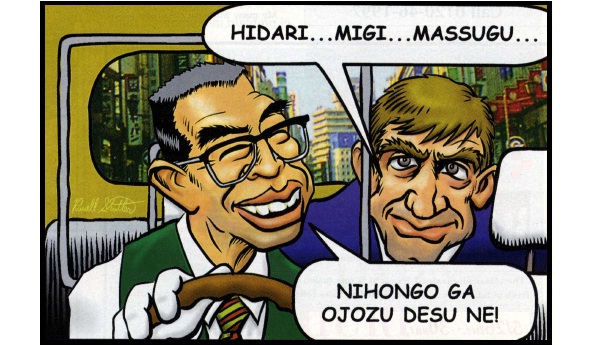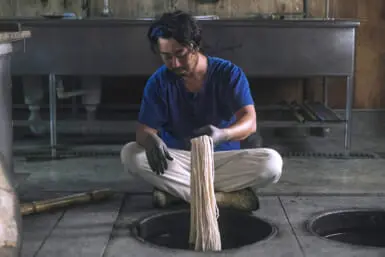Do you consider yourself to be fluent in Japanese? Am I fluent in that tongue? Is Luella Dinglebean across the street fluent? Let’s ask her.
Well, all my Japanese friends tell me I’m fluent,” replies Luella, plunging right into the heart of the matter, “but they said the same thing when I was first here and knew only ten or 12 words in the language.”
Miss Dinglebean has zeroed in on one of the problems regarding such fluency: namely, just who decides?
But, first, what do we really mean when we say “fluent”? One of my dictionaries offers the definition of “ready in the use of words,” but that is difficult to accept.
He spoke fluent Japanese, atrociously
I once worked briefly in a smallish trading company, an exporter of Christmas lights, in Osaka. The manager was a pre-war refugee from Eastern Europe who spoke Japanese at a tremendous clip; much faster than I spoke English. Nihongo poured from his lips in a torrent. He as most assuredly “ready in the use of words.”
But was he fluent? Not in my estimation. His Japanese was, in a word, atrocious. His pronunciation bordered on incomprehension. His vocabulary was severely limited. His grammatical constructions were laughable.
His use of the language in which we did business was such that the Japanese employees set up a system whereby they always approached his desk in pairs so they could later discuss and try to clarify what he had endeavored so “fluently” to communicate to them.
Seward’s definition
In general, I would define fluency as linguistic competence roughly equivalent to that of a graduate of an upper-middle school. Admittedly, this is an arbitrary determination, but I like to think that anyone deemed to be fluent in Japanese should have the following qualifications:
1. When using a Japanese name and speaking to a stranger on the telephone, he or she should be able to pass for a Japanese—or come close to it.
2. Know all or almost all of the 1,875 (?) Toyo Kanji with the on and kun readings and at least a couple of the compounds.
3. Be able to read a letter written in gyosho. (I won’t hold out for sosho.)
4. Be able to understand all or almost all of a newscast, if the subject matter is not impossibly technical.
5. Be able to read a newspaper or magazine article with only very occasional reference to a kanji dictionary. (I confess that I probably have to resort to a lexicon five or ten times while struggling though an article of average length, although in the case of my beloved ero-manga, I can peruse the provocative print with fewer dictionary detours.)
6. Write a decent letter in kaisho Japanese.
7. Give a ten-minute impromptu talk in comprehensible and correct Japanese an every-day topic requested by your audience.
8. Carry on a torrid love affair in words that will enable you to win the heart of your intended, who must speak no English.
9. Identify (even if you cannot completely understand) three rural dialects.
10. Stroll through your shopping district and read the first 20 signs you see in Japanese.
A quicker test
If the above is too complicated and time-consuming, I have another suggestion. Ask the person being tested to say, then write, the Japanese equivalent of “passenger plane.”
Easy-peasy, you say? I think not.
First of all, the pronunciation is quite tricky. Any foreigner who can readily and correctly twist his tongue around this little devil has already made remarkable progress in his studies. The three kanji themselves are not all that difficult, but in the second character (kyaku), you must drop—for obscure reasons—the “y” so that finally you come up with “ryokakki.”
So much for my personal definition of what constitutes being fluent in Japanese (and why I maintain that only a mere handful of Caucasians are qualified to be so considered.)
Who decides?
As Miss Luella Dinglebean above suggested, the Japanese will seldom offer a realistic appraisal of a foreigner’s ability in their native language. If I enter a bar and order a bottle of Kirin, the bartender will reflexively say, “Nihongo wa o-jozu desu ne.” God bless them, but it seems they are conditioned to say that and nothing else. Almost as a form of greeting.
I recall one semi-exception: A Japanese and I were discussing an American lawyer who had passed the Japanese bar exam. I had met this lawyer but had never had occasion to hear him speak Japanese, so I asked the man to whom I was talking, “How is so-and-so’s Japanese?” to which he dutifully answered, “Oh, he’s very good in Japanese.” Then he paused and added ruefully, “But I don’t understand much of what he says.”
The least-to-be-trusted judges of the abilities of others in Japanese are the foreign parents who ooh and aah when they tell of their kids “speaking Japanese just like natives,” even though they themselves know little if any of the language. If they did, they might realize that little Tommy and Jane have a total vocabulary of 50 or maybe even 100 words that they use over and over.
This leads into another aspect of “being fluent in Japanese.”
Long ago, in Omori, I lived next door to a German national who I often heard out in the back yard yelling at his children in perfect Japanese. One day, however, I chanced upon a news item in the vernacular Mainichi Shimbun about his family’s restaurant. Thinking he might not have seen it, I showed the piece to him. To my surprise, he confessed that he didn’t read Japanese at all, not even the Japanese portions of his own menus.
If pressed, I could tell dozens of stories about such imbalances in the Japanese abilities of various foreigners I have known.
Speaking Japanese not allowed
One of my language school classmates was born and raised in Kobe by missionary parents. At first, I thought he should be picture-perfect in Japanese, but in our language school, he was soon ranked in one of the lower sections. Even I, with only one semester of college Japanese to my credit, knew more than he did. (At this language school, under the auspices of the University of Michigan, we went through what I believe to have been the longest, most arduous and most concentrated course in written and spoken Japanese ever offered anywhere. If any of our Weekender readers would like a more full account of this course, I will send you a free copy of my autobiography, Seward’s Follies, if you will write to me at 10507 Brinwood, Houston, Texas, 77043.)
My Kobe classmate’s problem was that he had spoken only English in school (the Canadian Academy), his missionary parents knew no Japanese, and they would not allow their servants to speak Japanese. My classmate managed to pick up some gutter Japanese playing in the ‘hood, but if he brought Japanese friends home with him, they were sternly admonished never to speak Japanese on those Christian premises.
My many Michigan classmates are a mixed bag of capabilities. One of them became so accomplished in Bungo grammar that he wrote a book on that esoteric subject, but his conversation in modern Japanese was, according to one of his bolder Japanese auditors, awkward and “okashii.” Another became a fanatically dedicated reader of the vernacular press, and I don’t recall ever seeing him have to refer to a kanji dictionary, but he and his Japanese mistress often came close to blows over his alleged misuse of words in the spoken language.
Another classmate, with whom I once shared office space in the Masonic Building, was simply hopeless. There is no other word for it. How he graduated from our school I’ll never understand. Although he lived in Japan for many years, he gave up on the language early on and refused to even try to speak it in the later years of his residence.
The summing up
When we are told that a certain foreigner is “fluent in Japanese,” we should ask who made the judgment about that alleged fluency. If someone is reported to read and write Japanese quite well, we should determine if the person responsible for that appraisal knows all the Toyo Kanji.
Does “fluent in Japanese” mean the ability to pass the time of day with a fetching bar hostess or the capability of dashing off a mikudari-hen in gyosho?
When considering a foreigner’s reported fluency in Japanese, we should ask specific questions about his pronunciation, number of Toyo Kanji memorized, extent of vocabulary, inter alia.
After 56 years of close association with things Japanese, I know of only a dozen or so Caucasian foreigners who are truly fluent in Japanese. I am sure there are others I don’t know about, but I doubt there are very many.
(Editor’s Note: Since 1941, Jack Seward has been involved with the Japanese language as a student, teacher and author of more than 40 books, several of which are in Japanese. He has also been a lecturer on Japanese culture and communications, as well as a professional interpreter and translator. In 1986 the Emperor of Japan awarded Seward the Order of the Sacred Treasure, Third Class, for his efforts to deepen understanding and friendship between Japan and America. Seward now lives in Houston, Texas, with his Japanese wife and two sons.)









